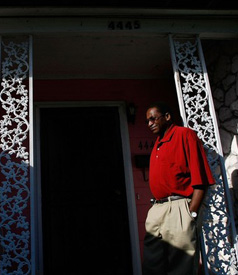The recession has resulted from, and contributed to, America's racial divide.
Last week, CNN reported that Obama's foreclosure prevention plan--the one that was supposed to keep millions of Americans in their homes by giving banks incentives to refinance mortgages--has not worked. In fact, just six percent of eligible households have received assistance.
The impact of this failure is catastrophic, as millions of homeowners continue to slide into foreclosure. People of color have been hit hardest by the crisis, facing disproportionate rates of foreclosure as well as higher levels of unemployment. The recession has deepened the racial divide.
This is why it seemed odd to many when Federal Reserve Chair Ben S. Bernanke met with world bankers and collectively declared the global economy to be back on track to normal. As long as we fail to address the struggles of working people and ignore the structures of racial inequity that helped push us all into recession, we will find that a return to normal will mean very little.
Earlier this year, I traveled the country from Michigan to Arizona, Rhode Island to Washington, researching race and the recession. Near Detroit, I met Leila*, who recently lost her job as a teacher's assistant and supports her four children alone.
She was laid off late last year because of state budget cuts. Her unemployment benefit ran out and she applied for government cash assistance. A month later, her welfare checks were also cut off and she was suddenly without any income.
Leila fell behind on her mortgage payments on the house she had just moved into. She realizes now she was sold an adjustable rate subprime loan. Her house went into foreclosure. Without any other wealth to fall back on, she's not sure what will happen.
Because people of color were disproportionately saddled with predatory loans, neighborhoods of color bear the brunt of foreclosures. Black, Latino, Asian and American-Indian families have been stripped of much of the wealth they had carefully accumulated over the years. The impact of these losses will last for generations.
That people of color face higher rates of foreclosure is no coincidence. Until the 1970s, communities of color were broadly excluded from owning homes as a result of racial "redlining" practices and racially restrictive neighborhood agreements. Then Congress passed the Community Reinvestment Act (CRA) to end discrimination in lending. Suddenly redlining and racial exclusion were made illegal and people of color slowly began to access prime loans.
But in the late 1990s, Congress deregulated the mortgage industry along with Wall Street, opening the space for industry to circumvent the CRA. These were the same anti-regulatory maneuvers that made subprime securitization possible.
As the CRA was weakened and incentives to sell subprime loans grew, neighborhoods of color provided fertile ground for the sale of these faulty products. Since communities like Leila's were largely devoid of prime lenders as a result of redlining, there was little competition and the credit vacuum created conditions for the predatory sale of high-cost loans to communities of color.
The streets of central Brooklyn and Detroit filled with predatory lenders and millions of these mortgages were sold. They ultimately burst, flooding the economy with toxic assets and submerging all of us in an economic storm.
In other words, the economic crisis is built on the country's long history of racial discrimination.
Recovery must prevent families from suffering the recession's worst results and lay a new foundation to avoid the kinds of unjust structures that put us all in this mess. Only by tackling racial inequity in the economy can we ensure a stable and just recovery.
An immediate halt on foreclosures is necessary, as is modernization of the Community Reinvestment Act. Government must mandate banks to renegotiate mortgages to less than 30 percent of income and lawmakers should pass legislation allowing those facing foreclosure to rent their homes from the bank.
Fixing the broken healthcare system, which is responsible for more than half of personal bankruptcies and has pushed scores into foreclosure, ought to have happened months ago.
Meanwhile, unemployment is at a 26-year high, and it's always much higher for people of color. Stimulus job creation money should be targeted to communities of color, where joblessness is literally killing people. In all this, racial impact assessments must be conducted to ensure we're building an equitable economy.
Recovery will not mean much if we return to the "normal" economy. Let's demand an economy that is good for all of us.
*Name changed.
---------
Seth Wessler is a researcher at the Applied Research Center in New York City. He has written extensively on immigration, criminal justice, economic inequality and the racial politics of national security. At ARC, he coordinates Race and Recession, a report and a multimedia project on the impact of economic recession in communities of color.
This article was originally published at InTheseTimes.com.



No comments:
Post a Comment